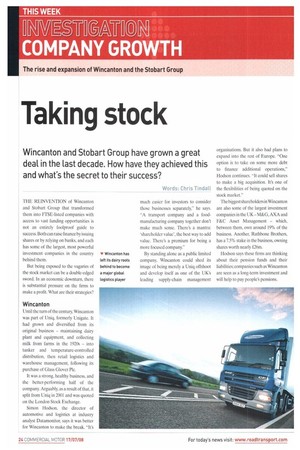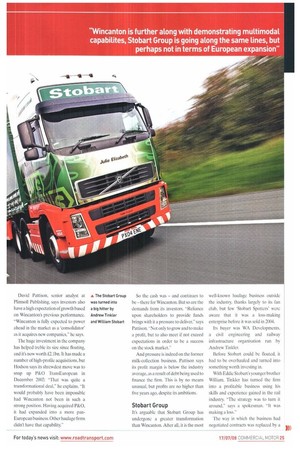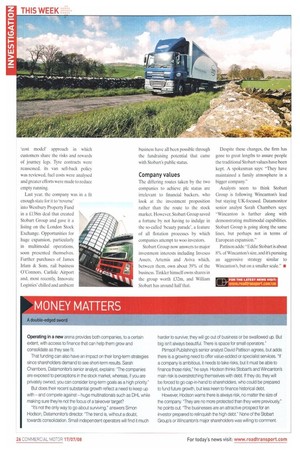Taking stock
Page 24

Page 25

Page 26

If you've noticed an error in this article please click here to report it so we can fix it.
Wincanton and Stobart Group have grown a great deal in the last decade. How have they achieved this and what's the secret to their success?
Words: Chris Tindall
THE REINVENTION of Wincanton and Stobart Group that transformed them into FTSE-listed companies with access to vast funding opportunities is not an entirely foolproof guide to success. Both can raise finance by issuing shares or by relying on banks, and each has some of the largest, most powerful investment companies in the country behind them.
But being exposed to the vagaries of the stock market can be a double-edged sword. In an economic downturn, there is substantial pressure on the firms to make a profit. What are their strategies?
Wincanton Until the turn of the century, Wincanton was part of Uniq, formerly Unigate. It had grown and diversified from its original business maintaining dairy plant and equipment, and collecting milk from farms in the 1920s into tanker and temperature-controlled distribution, then retail logistics and warehouse management, following its purchase of Glass Glover Plc.
It was a strong, healthy business, and the better-performing half of the company. Arguably, as a result of that, it split from Uniq in 2001 and was quoted on the London Stock Exchange.
Simon Hodson, the director of automotive and logistics at industry analyst Datamonitor, says it was better for Wincanton to make the break. "It's much easier for investors to consider those businesses separately," he says. -A transport company and a foodmanufacturing company together don't make much sense. There's a mantra: 'shareholder value', the best way to add value. There's a premium for being a more focused company."
By standing alone as a public limited company, Wincanton could shed its image of being merely a Uniq offshoot and develop itself as one of the UK's leading supply-chain management organisations. But it also had plans to expand into the rest of Europe. "One option is to take on some more debt to finance additional operations," Hodson continues. "It could sell shares to make a big acquisition. It's one of the flexibilities of being quoted on the stock market."
The biggest shareholders in Wincanton are also some of the largest investment companies in the UK M&G, AX A and F&C Asset Management which, between them, own around 19% of the business. Another, Rathbone Brothers, has a 7.5% stake in the business, owning shares worth nearly £26m.
Hodson says these firms are thinking about their pension funds and their liabilities; companies such as Wincanton are seen as a long-term investment and will help to pay people's pensions.
David Pattison, senior analyst at Plimsoll Publishing, says investors also have a high expectation of growth based on Wincanton's previous performance. "Wincanton is fully expected to power ahead in the market as a 'consolidator' as it acquires new companies," he says.
The huge investment in the company has helped treble its size since floating, and it's now worth £2.1bn. It has made a number of high-profile acquisitions, but Hodson says its shrewdest move was to snap up P&O TransEuropean in December 2002: "That was quite a transformational deal," he explains. "It would probably have been impossible had Wincanton not been in such a strong position. Having acquired P&O, it had expanded into a more panEuropean business. Other haulage firms didn't have that capability." So the cash was — and continues to be — there for Wincanton. But so are the demands from its investors. "Reliance upon shareholders to provide funds brings with it a pressure to deliver," says Pattison. "Not only to grow and to make a profit, but to also meet if not exceed expectations in order to be a success on the stock market."
And pressure is indeed on the former milk-collection business. Pattison says its profit margin is below the industry average, as a result of debt being used to finance the firm. This is by no means unusual, but profits are no higher than five years ago, despite its ambitions.
Stobart Group It's arguable that Stobart Group has undergone a greater transformation than Wincanton. After all, it is the most well-known haulage business outside the industry, thanks largely to its fan club, hut few 'Stobart Spotters' were aware that it was a loss-making enterprise before it was sold in 2004.
Its buyer was WA Developments, a civil engineering and railway infrastructure organisation run by Andrew Tin k ler.
Before Stobart could be floated, it had to be overhauled and turned into something worth investing in.
With Eddie Stobart's younger brother William. Tinkler has turned the firm into a profitable business using his skills and experience gained in the rail industry. "The strategy was to turn it around," says a spokesman. "It was making a loss."
The way in which the business had negotiated contracts was replaced by a 141,
'cost model' approach in which customers share the risks and rewards of journey legs. Tyre contracts were reassessed, its van sell-back policy was reviewed, fuel costs were analysed and greater efforts were made to reduce empty running.
Last year, the company was in a fit enough state for it to 'reverse' into Westbury Property Fund in a £138m deal that created Stobart Group and gave it a listing on the London Stock Exchange. Opportunities for huge expansion, particularly in multimodal operations, soon presented themselves. Further purchases of James Irlam & Sons, rail business O'Connors, Carlisle Airport and, most recently, Innovate Logistics' chilled and ambient business have all been possible through the fundraising potential that came with Stobart's public status,
Company vatues
The differing routes taken by the two companies to achieve plc status are irrelevant to financial backers, who look at the investment proposition rather than the route to the stock market. However, Stobart Group saved a fortune by not having to indulge in the so-called 'beauty parade', a feature of all flotation processes by which companies attempt to woo investors.
Stobart Group now answers to major investment interests including Invesco Assets, Artemis and Aviva which, between them, own about 39% of the business. Tinkler himself owns shares in the group worth £32m, and William Stobart has around half that. Despite these changes, the firm has gone to great lengths to assure people the traditional Stobart values have been kept. A spokesman says: "They have maintained a family atmosphere in a bigger company."
Analysts seem to think Stobart Group is following Wincanton's lead but staying UK-focused. Datamonitor senior analyst Sarah Chambers says: "Wincanton is further along with demonstrating multirnodal capabilities, Stobart Group is going along the same lines, but perhaps not in terms of European expansion."
Pattison adds: "Eddie Stobart is about 8% of Wincanton's size, and it's pursuing an aggressive strategy similar to Wincanton's, but on a smaller scale." •












































































































































































